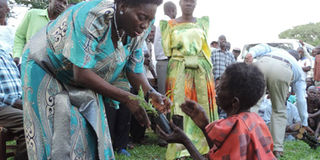Tree planting should be precondition for marriage, Kadaga tells clerics

Launch. Speaker Rebecca Kadaga (left) gives tree seedlings to one of the residents of Namasagali Sub-county during the launch of the tree planting campaign yesterday. PHOTO BY SAM CALEB OPIO
What you need to know:
- Scientists say there is a big linkage between vegetation cover, forests, livelihood and reducing emissions that result into climate change effects like long dry spell and extreme temperatures.
Kamuli. Religious leaders should start asking couples to present proof of having planted at least 15 trees on their wedding day before they are confirmed as husband and wife, Speaker of Parliament Rebecca Kadaga has proposed.
Speaking to Daily Monitor in Kamuli District, Ms Kadaga said Uganda is losing her great flora and fauna with consequent drought that has affected the agriculture and that time is now to arrest the situation.
“We are taking the environment for granted. There used to be Lake Chad but it disappeared. It is because of environmental damage. The solution is planting more trees to prevent our lakes, [rivers and wetlands] from disappearing,” Ms Kadaga said.
Chad, a freshwater lake in the Sahelian zone of west-central Africa, is shared by Chad, Cameroon, Nigeria, and Niger but it has almost disappeared due to a number of factors.
She added: “When we have a marriage, that ceremony should partly be used for tree planting. We plant five trees at girl’s home , five at the boy’s home and the other five where they are going to stay.”
Ms Kadaga said for marriages outside religious institutions, districts should come up with by-laws in that regard.
Since the departure of the colonial government in 1962, Uganda, once described by the British imperialist Winston Churchill, in 1908, as the “Pearl of Africa” partly because of its rich flora and fauna, has seen massive depletion of forests and wetlands.
Some forecasts gloomily predict that private land will not have forests in the next 10 years. This is backed by evidence from a 2016 Joint Water and Environment Sector Review Report that says forest cover has reduced from 24 per cent in 1990 to just 11 per cent in 2015.
Between 1990 and 2005, natural forest estate outside protected areas reduced by 35 per cent (from 3.46 million hectares in 1990 to 2.3 million hectares in 2005). People are converting hitherto forested land into agricultural land, timber and charcoal burning zones.
Mr Paul Mafabi, the director in charge of the environment at the Ministry of Water and Environment, recently said Uganda has already paid the effects of deforestation.
The ministry, hopes that, by 2030, would have reforested 100 million hectares of currently deforested and degraded land. To demonstrate their commitment, Mr Mafabi cites the country’s target of planting 200 million trees by the year 2020 embodied in the 2012 National Tree Planting Strategy.
Scientists say there is a big linkage between vegetation cover, forests, livelihood and reducing emissions that result into climate change effects like long dry spell and extreme temperatures.
[email protected]


